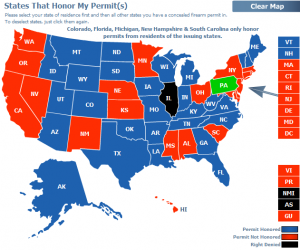Gun Rights: Pennsylvania vs. New Jersey
While many of our readers frequently cross the bridge to and from New Jersey and Pennsylvania without giving it much thought it’s important to realize that these two jurisdictions have dramatically different laws regarding firearms. In Pennsylvania the term “firearm” is defined as follows.
 “Any pistol or revolver with a barrel less than 15 inches, any shotgun with a barrel less than 18 inches, any rifle with a barrel less than 16 inches, or any pistol, revolver, riffle, or shot gun with an overall length of less than 26 inches.”
“Any pistol or revolver with a barrel less than 15 inches, any shotgun with a barrel less than 18 inches, any rifle with a barrel less than 16 inches, or any pistol, revolver, riffle, or shot gun with an overall length of less than 26 inches.”
In the Commonwealth of Pennsylvania any person or dealer selling a handgun must sell it or transfer it through a licensed dealer or the county sheriff’s office. Further, any firearm transferred or sold through a licensed dealer (this includes handguns, rifles, and shot guns) is subject to an instant records check of their purchaser. There are no transfer requirements for the transfer of handguns between spouses, parents to children or between active law enforcement officers. There is also no transfer requirement for shotguns. Individuals within the Commonwealth of Pennsylvania are free to transfer these types of firearms without any license or documentation. Antique firearms are also exempt from these transfer and license requirements.
With regards to possession, Pennsylvania doesn’t require a license to possess a handgun, rifle, or shotgun within your home or place of a business. If a handgun is being transported in a vehicle through Pennsylvania, without a license to carry, it must be unloaded. Pennsylvania does not require a permit to purchase rifles, shotguns, or handguns nor does it require a person to register their firearms or obtain a license to simply own one. The Commonwealth, however, does require a permit to carry a handgun outside of a person’s home or place of business.
In State of New Jersey (aka “The Garden State”) the law is much different. It’s illegal to sell, give, transfer, or acquire any type of firearm, including a rifle or a shotgun, unless the buyer possesses a valid firearms purchase identification card and the seller signs a written certification identifying the purchaser. Unlike Pennsylvania, New Jersey requires a license to own a firearm of any type including antique firearms.
It is also illegal in New Jersey to even possess a firearm anywhere without a permit to carry and the law doesn’t make distinction between open or concealed carry. Pennsylvania doesn’t require a permit to purchase nor does it require a license to own a firearm including handguns. Like New Jersey, however, Pennsylvania requires a permit to carry a hand gun outside of your home or business.
Finally, while Pennsylvania and New Jersey share a river, and 3 bridges, the sharing ends there. Similar to license to practice law, New Jersey doesn’t honor a Pennsylvania gun permit so if you cross over into New Jersey with any type of firearm, you are potentially committing a crime. If a lawyer wants to practice law in the Garden State, he/she needs to pass its bar exam and if you want to have firearm you need to meet New Jersey’s requirements. While Pennsylvania has some tough gun laws, New Jersey has even harsher penalties which include mandatory minimum prison sentences.
In closing, many people ask the difference between a Commonwealth and a State. There is no legal difference and the term “Commonwealth” on emphasizes that Pennsylvania’s state government is based on the common consent of the people. The term symbolizes its freedom from the former Monarchy (i.e. Great Britain & King George). There are only 3 other states who make this distinction–Kentucky, Massachusetts and Virginia.

